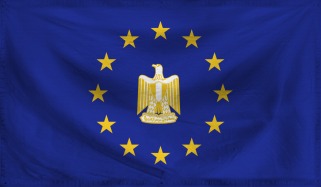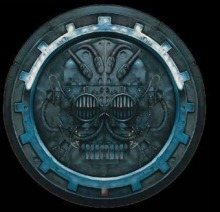We the Peoples of the United Nations  Some of us tried, kiddo. Through all the plagues and famines and civil wars, bound to a dying Earth that cooked us alive, some of us still remembered the old hope. Even when it was all nearly over anyway: some of us remembered, and some of us fought like hell. ☉ ☉ ☉ REQUIEM 2☉95 ~ A roleplay by NORV, inspired by the work of PLZEN ~ IC / / / DISCORD ONE HUNDRED YEARS have passed since the downfall of the Soviet Union. A century and a half has passed since the defeat of Nazi Germany. But the triumph of the liberal world order was short-lived, and in its refusal to curb its own reliance on fossil fuels, that brief golden age nurtured the seeds of its own destruction. The twenty-first century has been defined by the slow creep of the climate crisis: a crisis that reached irreversible proportions in the 2040s, and that has only worsened since. By 2095, its effects are beyond number and almost beyond endurance. For half a century, our globalized world has suffered lethal pandemics that kill millions every winter. Megatsunamis and hurricanes batter coastlines; drought and desertification hollow out fertile grasslands. As resources tighten, great-power war returns to world affairs: war over oil, over arable land, over water. The pace of technological advancement slows; the challenges facing our species accelerate. The rich hoard their wealth and genetically customize their children and retreat to estates in Greenland, while the rest of us struggle for bread. To be a man in such times is to live within sight of a new dark age: a collapse of all the systems that make modern civilization possible. Every day, every headline, brings that collapse inexorably closer. But some of us still defy fate, and dare to hope for a better tomorrow. Nationalists and communists try to wall off their people from foreign ways or foreign capital, and survive through revolutionary solidarity. Others - led by China, the world's greatest power - put their faith in centralized management and surveillance and authority, seeking to tame human passions and appetites and to maximize efficiency and control. Some countries have embraced the blighted earth, willingly turning their back on traditional industry and business, and seeking ways to live in harmony with nature. And a few nations, led by an America still reeling from its second civil war, cling with fierce ardor to the old ways of liberal democracy and mixed markets. Even at the threshold of apocalypse, there is still no escaping the human willingness to kill other humans over ideology. If we can kill, though, we can also build. We can dream with unprecedented audacity in the face of unprecedented threats. We can risk all, for the stakes of this hour are already life-and-death, and few of us have anything left to lose. If these years are to be our REQUIEM, let them be a music of defiance. We choose to rage against the dying of the light. WELCOME, ALL, TO REQUIEM 2095: a geopolitical roleplay set in the late 21st Century. In this semi-dystopian, pessimistic - indeed, pre-apocalyptic - vision of our collective future, each player will represent a sovereign power that administers some territory. You may play as a country, or as any of those challenges to traditional governments that flourish in an era of state weakness: rebel organizations, sovereign religious institutions, independent corporations, and the like. Together, you will face the seemingly insurmountable challenges of days that certainly seem like the end times for industrial civilization. And you will discover how, even in the midst of utter crisis, traditional rivalries and ideologies can still make cooperation perilously near to impossible. In drafting your application, please note that the point of divergence is 2020. Events after 2020 can be adjusted to make your application work; events before 2020 must be held constant as a shared historical foundation for all players. (Contact me directly to request an exemption.) Try to make your application a natural, plausible outgrowth of real-world events in the period between 1945 and 2020; the twenty-first century should follow logically from the defining events of the twentieth - like the Western victory in the Cold War, the Communist takeover of China, and the global reliance on fossil fuels. The details of the setting will largely be up to the players to determine, as we build the world one application at a time. But for general information, please consult the following notes. These notes deal with the challenges that every application will have to discuss. Above all, remember that the last century has not been a story of prosperity. Rather, for every country in the world, it has brought decline: some combination of economic collapse, civil war, or - at best - mere stagnation. In this world, being a global power means only that you are failing more slowly than everybody else. Do not go gentle into that good night, Old age should burn and rave at close of day; Rage, rage against the dying of the light. Though wise men at their end know dark is right, Because their words had forked no lightning they Do not go gentle into that good night. Good men, the last wave by, crying how bright Their frail deeds might have danced in a green bay, Rage, rage against the dying of the light. Wild men who caught and sang the sun in flight, And learn, too late, they grieved it on its way, Do not go gentle into that good night. JOIN THE REQUIEM: Your applications will be judged on the quality of your writing and the creativity of your ideas, and not necessarily on encyclopedic completeness. For this reason, I’ve left the application largely unformatted: you should simply tell me, in the way that makes the most sense to you, everything that I need to understand your concept and to imagine its global role in our shared story. After reading your application, I should know why/how your concept exists, what territory it covers, and roughly how much regional/global influence it has. An application that achieves that goal may take the form of a Wikipedia-style entry, a set of letters or interviews, a traveler’s journal, or any other format that demonstrates your ability as a writer. I will not be requesting an RP sample, since I will be judging your writing from the application itself. As you develop your application, please try to ground your concept in history before 2020: this should be a natural, if perhaps an unexpected, evolution from the world we know. Also, please be sure to answer the following two questions: what kind of regime are you applying for, and what is its ideological outlook?
The reservation format is as below. Reservations last three days. It is intended that you put up a reservation when you start writing your application, to avoid having someone else put up an application for the same territory first while you were hard at work researching for your application. A WIP application will be treated as replacing the reservation, and reserving the territory in question on an indefinite basis.
THE INTERNATIONAL COMMUNITY THE UNITED STATES OF AMERICA CAPITAL: WASHINGTON, DOUGLASS COMMONWEALTH | REVEREND NORV | OUTLOOK: LIBERAL | APPLICATION (Part 1 / Part 2) Systemic tensions, as old as the legacy of slavery and as recent as online conspiracy theories, led to a half-century of American decline and spelled the end of the liberal world order. That decline reached its nadir with the Reckoning, America's terrible four-way civil war. The country has emerged from that crucible weakened in body, but annealed in spirit: reduced in wealth and prestige, but strengthened in the efficiency of its institutions and the power of its social solidarity. Americans, united as rarely before, have rediscovered their purpose - and the United States steps forth once again onto the global stage as a rejuvenated champion of free trade, free elections, and free human beings. THE UNITED STATES OF POLARIS CAPITAL: NOVO VOLGOGRAD, MAUD GOVERNATE | G-TECH CORPORATION | OUTLOOK: LEGALIST| APPLICATION In a world riven by divisions and desperate for resources, old ecological qualms were cast aside and the capitalist systems of the world eagerly devoured Antarctica. On the Astral Continent heedless industrialization and human suffering combined with wanton profits to form the hideous amalgamation state that is Polaris, a corporate fiefdom of competition and deregulation of hitherto undreamt proportions. In her undercities sheltered from the dire conditions of the turbulent continent the huddled masses who came seeking a better life are exploited by landed gentry and fabulously wealthy overlords, Great Houses alongside corporations competing for power and influence in the Imperial Senate even as unscrupulous arms dealers sell the wealth of the continent to the most dangerous factions of the fractured world. And yet the masses still come, for in Polaris one can rise as in few other places, even though most are trampled underfoot by the uncaring machine.
|





















